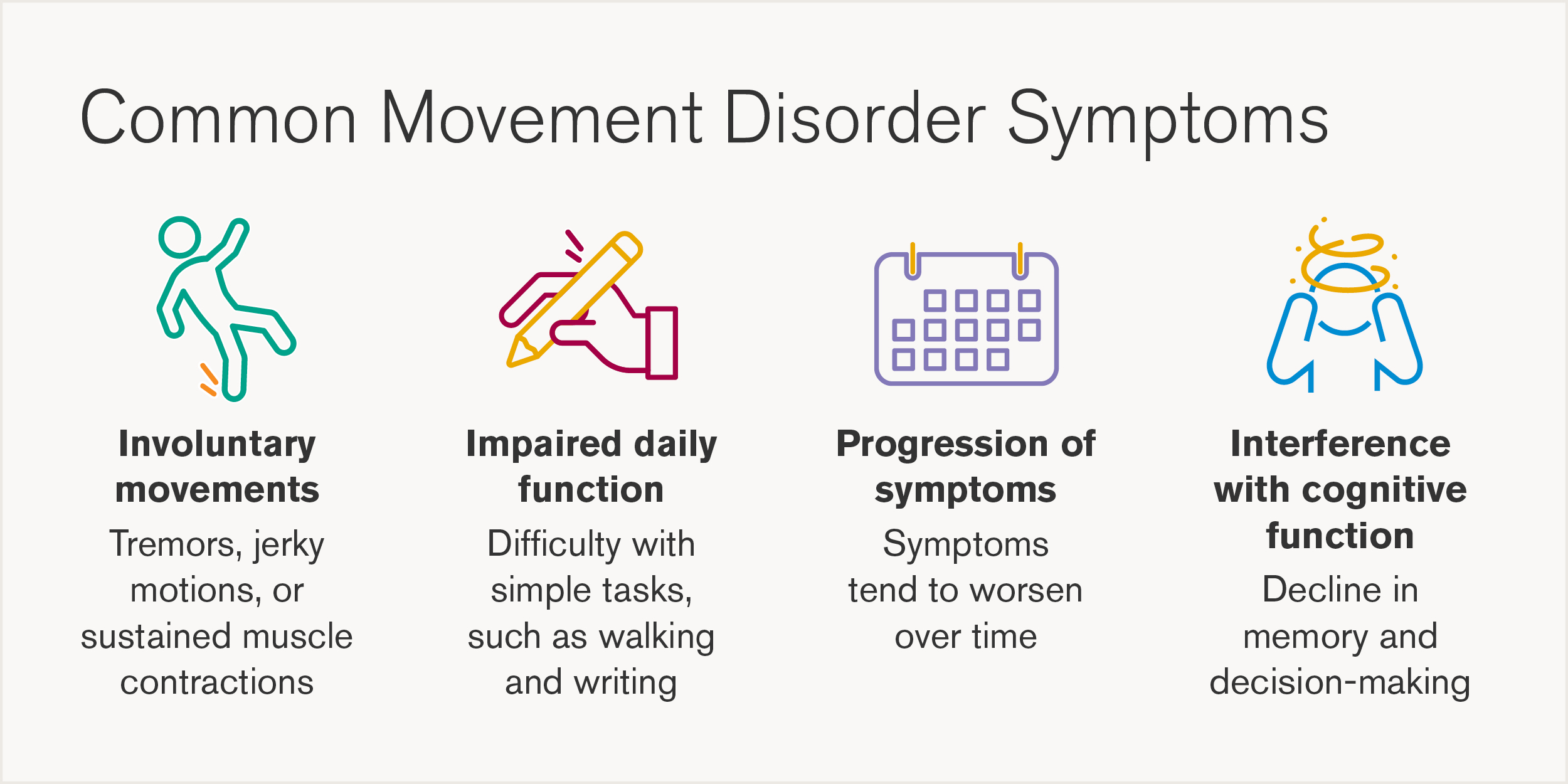A Comprehensive Guide to Neurological Movement Disorders
February 27, 2024
Categories: Neurology & Neurosurgery
 By Behzad Elahi, MD, PhD, Neurology and Neurosurgery
By Behzad Elahi, MD, PhD, Neurology and Neurosurgery
A neurological movement disorder is any nervous system condition that changes how the body moves, whether voluntary or involuntary. Unfortunately, many of these conditions can make simple tasks difficult for patients who are diagnosed.
We spoke with Behzad Elahi, MD, PhD, a movement disorder specialist at Loyola Medicine, about the different types of disorders and their causes.
"A patient is officially diagnosed with a neurological movement disorder when the symptoms start to affect people's function and day-to-day living," says Dr. Elahi. "These diseases can cause excessive movement, lack of movement, neurological cell death, and much more. There is a wide variety of symptoms and diseases that can be classified as neurological movement disorders."
Types of neurological movement disorders
There are many types of movement disorders, each with their own symptoms, causes, risk factors and treatment options. Below are some of the most common.
Parkinson's disease
Parkinson's disease is a neurodegenerative disease – a condition that causes nerve cells in the brain or nervous system to lose function over time and eventually die – that can affect any part of the body controlled by nerves.
"There is a group of diseases under the umbrella term, 'Parkinsonism,' which is any motor disorder that manifests as rigidity, tremors, and slowing of the muscles," says Dr. Elahi. "Parkinson's disease comprises about 80% of cases of Parkinsonism and is the disorder I deal with the most when speaking with patients."
Parkinson's primarily affects the dopamine-producing part of the brain known as substantia nigra, an area of the brain that plays a critical role in modulating motor movement and reward functions. Dopamine affects many parts of the central nervous system, including movement control and emotional control.
There is no cure for Parkinson's disease, but medication or surgery can drastically improve the quality of life for patients.
Symptoms
Generally, symptoms develop slowly over years. The progression of symptoms can be different from person to person due to the different ways Parkinson's can affect the body. Early stage symptoms may go mild and unnoticed, such as your face showing little expression.
Other symptoms include:
- Tremors
- Slowed movement
- Rigid muscles
- Impaired posture and balance
- Loss of automatic movements
- Speech changes
- Writing changes
Causes
The cause of Parkinson's disease is not known, but some factors seem to play a bigger role than others.
- Genetics. There are specific genetic changes that have been shown to trigger Parkinson's. However, these are fairly uncommon, unless a family member is also affected.
- Environmental triggers. Although the risk is small, certain toxins or environmental factors can increase the risk of the disease.
Huntington's disease
Similar to Parkinson's, Huntington's disease is a neurodegenerative condition that causes the eventual death of nerve cells in the brain. This can result in movement, cognitive and psychiatric diseases over time, having a significant impact on the patient's ability to function.
Unfortunately, there is no cure for Huntington's nor can any treatment prevent the eventual physical, mental and behavioral decline in patients. However, medication is available to manage the symptoms.
Symptoms
Like Parkinson's, Huntington's disease can appear as many symptoms, some of which will vary greatly from person to person. The symptoms can even change throughout the course of the disease, having a greater effect when first appearing and diminishing over time or vice versa.
In general, there are different symptoms for movement, cognitive and psychiatric diseases caused by the disease.
Movement disorders
- Involuntary jerking or writhing movements
- Muscle problems, such as rigidity or muscle contracture
- Slow or unusual eye movements
- Impaired gait, posture and balance
- Difficulty with speech or swallowing
Unfortunately, many of these impairments are involuntary movements, which can have a greater impact on a patient's ability to work, perform daily activities, and remain independent.
Cognitive disorders
- Difficulty organizing, prioritizing or focusing on tasks
- Lack of flexibility or the tendency to get stuck on a thought, behavior or action
- Lack of impulse control
- Lack of awareness of one's own behaviors and abilities
- Slowness in processing thoughts
- Difficulty in learning new information
Psychiatric disorders
- Feelings of irritability, sadness or apathy
- Social withdrawal
- Insomnia
- Fatigue and loss of energy
- Frequent thoughts of death, dying or suicide
Other psychiatric conditions can also occur, such as obsessive-compulsive disorder (OCD), mania and bipolar disorder.
Causes
The main difference between Parkinson's and Huntington's is the cause. While researchers aren't certain what causes the former, and the connection to genetics is complicated, Huntington's disease is caused by a difference in a single inherited gene.
Someone only needs to inherit one copy of the different gene to develop the disease. Because the gene is dominant, each child born to a parent with the gene has a 50-50 chance of inheriting the gene themselves.
Dystonia
Dystonia is a muscle disease that causes involuntary contraction, including repetitive or twisting motions. It can affect one, two or more, or all parts of your body, and the spasms can be mild or severe. Some of the spasms are painless while others can be fairly painful.
This disease can affect the body by itself or be a symptom of other conditions, such as Huntington's or Parkinson's. Similar to those diseases, dystonia has no cure, but medications, therapy and surgery can improve symptoms.
Symptoms
Like other neurological movement diseases, symptoms of dystonia can appear differently in different people. Generally, consistent muscle spasms in one or more areas of your body could indicate you have the condition.
Causes
The exact cause of dystonia is not known. Scientists believe it has to do with how the nerve cells in different parts of the brain communicate with each other. Dystonia can also be passed down in families. You're more likely to suffer from dystonia if you suffer or have suffered from these conditions:
- Parkinson's disease
- Huntington's disease
- Wilson's disease
- Traumatic brain injury
- Birth injury
- Stroke
- Brain tumor
- Oxygen deprivation or carbon monoxide poisoning
- Infections, such as tuberculosis or encephalitis
- Reactions to certain medications or heavy metal poisoning
Restless legs syndrome
If you've ever felt the compulsive need to shake or bounce your leg, you may suffer from restless legs syndrome (RLS). As the name suggests, this disorder is characterized by a strong urge to move the legs. It usually occurs during the evening while sitting or lying down.
RLS can begin at any age and can worsen as you get older. Self-care steps, lifestyle changes, and medications can help people who suffer from RLS.
Symptoms
The main symptom for RLS is an urge to move your legs. Alongside this urge, you may feel:
- Sensations that begin while resting
- Relief with movement
- Worsening of symptoms in the evening
- Nighttime leg twitching
Some patients describe the urges as pulling, throbbing, aching, itching, and electric. Most people usually don't describe the sensation as a muscle cramp or numbness. However, the common sensation is a desire to move the leg(s).
RLS may be associated with another, more common condition called periodic limb movement of sleep (PLMS), which causes the legs to twitch and kick, possibly throughout the night, while you sleep.
Causes
Many times, RLS has no cause. Some research suggests that RLS may be caused by an imbalance of dopamine in the brain. This neurochemical is used to send messages to control muscle movement. But no exact cause has been determined. Many times, perfectly healthy patients will suffer from RLS.
Sometimes, RLS can run in families, especially if the patient started experiencing the condition before turning 40. Pregnant women also sometimes experience RLS signs and symptoms, although they usually go away after delivery.
Commonalities and differences in neurological movement disorders
It can be difficult to distinguish between different neurological movement disorders. Many show themselves with similar symptoms or one condition can be a symptom of another. However, it's important to understand the similarities and differences so you can learn about your specific condition and how best to find treatment.
"While there are certain hallmarks of specific diseases that can help patients identify a certain disorder, I suggest speaking with a specialist or their primary care doctor if they are suffering from certain symptoms," says Dr. Elahi. "It will be hard for them to parse out correct information if they're simply searching online."

There are common, shared characteristics between different conditions, such as:
- Involuntary movements: Many movement diseases involve involuntary movements, such as tremors, jerky motions, or sustained muscle contractions. These movements can impact various parts of the body, leading to motor dysfunction.
- Impact on daily functioning: These conditions can significantly affect an individual's daily life, interfering with activities like walking, writing, and other simple tasks.
- Progression over time: The majority are progressive, meaning symptoms tend to worsen over time. Progression rates and severity vary between conditions and individuals.
- Interference with cognitive function: Cognitive impairment is observed in some movement disorders, affecting memory, decision-making, and overall cognitive abilities. Sometimes, memory and movement diseases can appear at the same time, such as Alzheimer's and Parkinson's.
Despite these disorders sharing similar traits, there are key differences in symptoms and progression that can help differentiate your disorder with another.
- Nature of movement abnormalities: The specific types of movement abnormalities vary between disorders. For instance, Parkinson's disease is characterized by tremors and slowness of movement while Dystonia involves sustained or repetitive muscle contractions, leading to abnormal postures.
- Genetic vs. non-genetic causes: Genetic factors play a significant role in certain movement disorders like Huntington's disease, where a specific gene mutation is inherited. Others, such as some forms of dystonia, may not have a clear genetic basis and could result from a combination of genetic and environmental factors.
- Onset and age of presentation: The age at which symptoms first appear varies. Parkinson's disease often presents in adulthood or later, while some types of dystonia may manifest in childhood.
- Treatment approaches: Treatment strategies differ based on the specific disorder. For example, Parkinson's disease is often managed with medications targeting dopamine levels, while dystonia may involve botulinum toxin injections or deep brain stimulation.
Loyola Medicine offers compassionate treatment for movement disorders
Loyola’s compassionate team understands that movement diseases can be life-changing for the patient and their family. As an academic medical center, Loyola provides exceptional care and support services to patients and trains future leaders in neurology and neurosurgery.
Loyola’s neurologists are board certified and are experts in performing nerve conduction studies, EEGs, EMGs, Botulinum toxin injections, and Deep Brain Stimulation (DBS) programming and placement to correctly diagnose and treat neurological disorders. Our neuro intensive care unit is equipped with continuous EEG and video monitoring for adults and children and is staffed by certified technologists and trained neurology nurses.
A dedicated Parkinson’s disease support group is also offered for free to patients and their families.
Behzad Elahi, MD, PhD, is a movement disorder specialist and is an Assistant Professor of Neurology and Neurosurgery at Loyola University Medical Center. He specializes in movement disorders, clinical neurophysiology and electrodiagnostic medicine.
Dr. Elahi earned his medical degree from Tehran University of Medical Sciences and his PhD in neuroscience and neuromodulation from the University of Toronto in Canada. He completed a residency in neurology at Tufts Medical Center, followed by two fellowships in clinical neurophysiology at Mayo Clinic in Rochester, MN and movement disorders from McGaw Medical Center of Northwestern University in Chicago.
Book an appointment today to see Dr. Elahi or another of Loyola Medicine's specialists by self-scheduling an in-person or virtual appointment using myLoyola.
